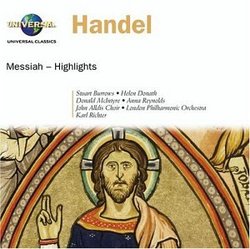| All Artists: George Frederick Handel, Karl Richter, London Philharmonic Orchestra, Edgar Krapp, Helen Donath, Stuart Burrows Title: Handel: Messiah (Highlights) Members Wishing: 0 Total Copies: 0 Label: Umvd Labels Release Date: 10/14/2003 Genres: Special Interest, Classical Styles: Holiday & Wedding, Opera & Classical Vocal, Historical Periods, Baroque (c.1600-1750) Number of Discs: 1 SwapaCD Credits: 1 UPC: 028947477723 |
Search - George Frederick Handel, Karl Richter, London Philharmonic Orchestra :: Handel: Messiah (Highlights)
 | George Frederick Handel, Karl Richter, London Philharmonic Orchestra Handel: Messiah (Highlights) Genres: Special Interest, Classical
|
Larger Image |
CD Details |
CD ReviewsOne of the best! John Bratincevic | Chicago IL | 12/12/2008 (5 out of 5 stars) "Originally written for my school paper and my review blog...check my profile if you are interested.
Note that this was for the complete set, not just the highlights. But this highlights disc is what made me find the complete recording! --- One of the most honored holiday traditions of Anglo culture is performances of Handel's Messiah. Most of us have attended at least one in our lives--we even have a biannual performance here at Elmhurst College that is always quite respectably done and is a standing recommendation. Nevertheless, experience strangely reveals that too few actually own a copy of Messiah on disc. It therefore seems appropriate to highlight recommend this present performance of Karl Richter's, which stands firmly in the Romantic Messiah tradition preserved through the last century. Unlike most modern recordings, this Messiah utilizes a full orchestra, large chorus, and operatic soloists who do no ornamentation. To the "period performance" type, this doubtless sounds horrific, but the fact of the matter is that this performance is one of recorded music's best kept secrets, unfairly relegated to obscurity. Richter's conducting confirms his status as the then-reigning Bach expert--squarely Germanic, displaying broad, stately tempi and a good sense of baroque rhythm. The opening overture is vested with weight and great seriousness, but doesn't drag--you may miss the double-dotting often read into the score if that's what you're used to, but the more traditional approach succeeds very well on its own terms. In particular the "Pastoral Symphony" is very pretty and lovingly phrased. The sound he draws from the orchestra is bit relaxed and mellow (the strings sound almost lazy in places), but very deep and appropriate to his stately conception. Richter's approach is well served by the John Alldis Choir, whose mature sound and admirable precision are on full display throughout. The lengthy melismas of "And He Shall Purify" sound quite comfortable for the ensemble and Richter's dynamic changes are very well judged. "For Unto Us a Child is Born," and "Hallelujah" both capture the necessary joy and grandeur of the words. Perhaps the only misfire is "Behold the Lamb God," where the absence of double dotting inhibits the dramatic punch of the music. The soloists are all rock solid vocally and are all native English speakers, delivering satisfying renditions of all the works solo "highlights." Helen Donath and Anna Reynolds both consistently perform capably and musically, Donath notable for her sweet, even timbre. Donald Macintyre's Wagnerian bass-baritone is sonorous, powerful, and delivers his solo pieces with suitable majesty and control. Most refreshingly, he also sings "But Who May Abide the Day of His Coming," eschewing the inferior practice of giving this aria to the alto. But the tenor is the real standout here--in Stuart Barrows we have a consummate oratorio tenor, warm and bright, at once both gentlemanly and heroic. His performances of "Comfort Ye" and "Ev'ry Valley" are darn near perfect, elegant and sincere in the recitative, breezy and cheerful in the aria. And he is equally capable in "Thou Shalt Break Them," correctly conveying the anger of the text with through both color and his explosive high notes. In all, this performance produces a most singular and valuable quality: a feeling of timelessness, perfectly capturing the eternal nature of both the music and its subject matter. The album is definitely worth owning, and its relative obscurity makes it a fairly cheap proposition (around $8 on Amazon at the time of writing). If you don't already Messiah, get this one." |

 Track Listings (21) - Disc #1
Track Listings (21) - Disc #1